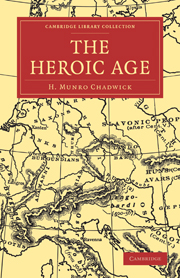Book contents
- Frontmatter
- PREFACE
- Contents
- DEDICATION
- CHAPTER I THE EARLY NARRATIVE POETRY OF THE TEUTONIC PEOPLES
- CHAPTER II THE HEROIC AGE OF THE TEUTONIC PEOPLES
- CHAPTER III SCENE AND NATIONALITY IN THE HEROIC STORIES
- CHAPTER IV THE ORIGIN AND HISTORY OF THE HEROIC POEMS
- CHAPTER V THE POETRY AND MINSTRELSY OF EARLY TIMES
- CHAPTER VI SUPERNATURAL ELEMENTS IN THE HEROIC STORIES
- CHAPTER VII MYTHICAL ELEMENTS IN THE HEROIC POEMS
- CHAPTER VIII THE USE OF FICTION IN THE HEROIC POEMS
- CHAPTER IX THE HEROIC AGE OF GREECE
- CHAPTER X THE HOMERIC POEMS
- CHAPTER XI EARLY GREEK POETRY AND MINSTRELSY
- CHAPTER XII SUPERNATURAL ELEMENTS IN THE HOMERIC POEMS
- CHAPTER XIII MYTH IN THE HOMERIC POEMS
- CHAPTER XIV FICTION IN THE HOMERIC POEMS
- CHAPTER XV THE COMMON CHARACTERISTICS OF TEUTONIC AND GREEK HEROIC POETRY
- CHAPTER XVI SOCIETY IN THE HEROIC AGE
- CHAPTER XVII GOVERNMENT IN THE HEROIC AGE
- CHAPTER XVIII RELIGION IN THE HEROIC AGE
- CHAPTER XIX THE CAUSES AND ANTECEDENT CONDITIONS OF THE HEROIC AGE
- ADDENDA ET CORRIGENDA
- INDEX
- Plate section
CHAPTER XI - EARLY GREEK POETRY AND MINSTRELSY
Published online by Cambridge University Press: 07 September 2011
- Frontmatter
- PREFACE
- Contents
- DEDICATION
- CHAPTER I THE EARLY NARRATIVE POETRY OF THE TEUTONIC PEOPLES
- CHAPTER II THE HEROIC AGE OF THE TEUTONIC PEOPLES
- CHAPTER III SCENE AND NATIONALITY IN THE HEROIC STORIES
- CHAPTER IV THE ORIGIN AND HISTORY OF THE HEROIC POEMS
- CHAPTER V THE POETRY AND MINSTRELSY OF EARLY TIMES
- CHAPTER VI SUPERNATURAL ELEMENTS IN THE HEROIC STORIES
- CHAPTER VII MYTHICAL ELEMENTS IN THE HEROIC POEMS
- CHAPTER VIII THE USE OF FICTION IN THE HEROIC POEMS
- CHAPTER IX THE HEROIC AGE OF GREECE
- CHAPTER X THE HOMERIC POEMS
- CHAPTER XI EARLY GREEK POETRY AND MINSTRELSY
- CHAPTER XII SUPERNATURAL ELEMENTS IN THE HOMERIC POEMS
- CHAPTER XIII MYTH IN THE HOMERIC POEMS
- CHAPTER XIV FICTION IN THE HOMERIC POEMS
- CHAPTER XV THE COMMON CHARACTERISTICS OF TEUTONIC AND GREEK HEROIC POETRY
- CHAPTER XVI SOCIETY IN THE HEROIC AGE
- CHAPTER XVII GOVERNMENT IN THE HEROIC AGE
- CHAPTER XVIII RELIGION IN THE HEROIC AGE
- CHAPTER XIX THE CAUSES AND ANTECEDENT CONDITIONS OF THE HEROIC AGE
- ADDENDA ET CORRIGENDA
- INDEX
- Plate section
Summary
In Chapter V we saw that four well-marked stages may be distinguished in the history of Teutonic heroic poetry. The first is that of strictly contemporary court poetry, dealing with the praises or the adventures of living men. The second is that of epic or narrative court poetry, which celebrates the deeds of heroes of the past, though not of a very remote past. The third is the popular stage, during which the same stories were handled by village minstrels. The last stage is that in which the old subjects again found favour with the nobility in Germany and were treated in a new form which reflected the conditions of the age of chivalry. We must now see whether any such stages can be traced in the history of Greek heroic poetry.
For the first stage plenty of evidence is supplied by the Homeric poems. In the Odyssey we meet with several persons who seem to be professional court minstrels. Such are Demodocos at the court of Alcinoos and Phemios at that of Odysseus, while others are mentioned at the courts of Agamemnon and Menelaos. Both Demodocos and Phemios are represented as singing of recent events, namely the adventures of the Achaeans on their return from Troy, though the former also produces one song upon a mythical subject. The song or recitation is invariably accompanied upon a lyre, probably much in the same way as the Teutonic minstrel used his harp.
- Type
- Chapter
- Information
- The Heroic Age , pp. 221 - 248Publisher: Cambridge University PressPrint publication year: 2010First published in: 1912



